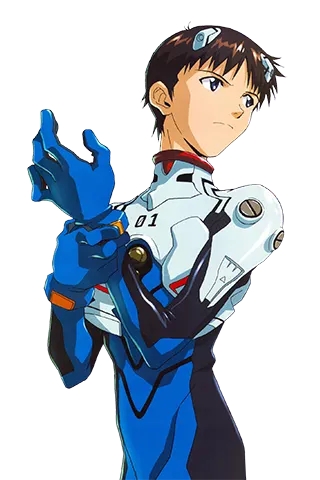Shinji Ikari: A Deep Dive into the Boy Who Wouldn’t Fight
Shinji Ikari is arguably one of the most complex and controversial protagonists in anime history. He’s the central figure in Neon Genesis Evangelion, and his internal struggles are the heart of the series. Here’s a comprehensive look at him, covering his background, personality, role in the story, and lasting impact:
Background
- Early Life & Trauma: Shinji’s childhood was marked by profound emotional neglect. His father, Gendo Ikari, a brilliant but cold scientist, prioritized his work on the Evangelion project over his son. His mother, Yui Ikari, died when he was very young in a mysterious incident involving the Evangelion Unit-01. This loss, coupled with his father’s emotional distance, left him with deep-seated feelings of abandonment, loneliness, and inadequacy.
- Summoned to Tokyo-3: At age 14, Shinji is abruptly summoned to Tokyo-3 by his father, who he hasn’t seen in years. He’s told he’s been chosen to pilot the Evangelion Unit-01, a giant bio-mechanical weapon designed to fight against monstrous beings called Angels.
- Reluctant Hero: Shinji doesn’t want to pilot the Eva. He’s terrified, insecure, and lacks any heroic aspirations. He’s forced into the role by his father’s authority and the weight of humanity’s survival.
Personality
- Introverted & Withdrawn: Shinji is incredibly shy and struggles to connect with others. He builds walls around himself to avoid further emotional pain.
- Self-Loathing & Low Self-Esteem: He constantly doubts his own worth and believes he’s a burden to those around him. He often asks himself, “What’s the point?” and feels he has no reason to exist.
- Fearful & Anxious: He’s plagued by anxiety, particularly regarding piloting the Eva and facing the Angels. He’s terrified of death, injury, and failing those who depend on him.
- Desire for Connection: Despite his walls, Shinji desperately craves acceptance, love, and genuine connection with others. This desire is a driving force behind his actions, even if he struggles to express it.
- Passive & Indecisive: He often avoids conflict and struggles to make decisions, leading to frustration from those around him. He’s easily manipulated and often feels powerless.
- Capable of Kindness & Compassion: Beneath his layers of insecurity, Shinji is capable of great kindness and empathy. He genuinely cares for those he allows himself to get close to.
Role in the Story
- The Pilot of Unit-01: Shinji’s compatibility with Unit-01 is central to the plot. The Eva seems to respond to his emotional state, and his piloting is often erratic and unpredictable.
- Catalyst for Exploration of Psychological Themes: Shinji’s internal struggles are the lens through which Evangelion explores themes of depression, trauma, isolation, identity, and the human condition.
- Relationship Dynamics: His relationships with other characters – Rei Ayanami, Asuka Langley Soryu, Misato Katsuragi, and his father Gendo – are crucial to his development (or lack thereof). These relationships are often fraught with tension, misunderstanding, and emotional manipulation.
- The Hedgehog’s Dilemma: Shinji embodies the “hedgehog’s dilemma” – the idea that the closer people get to each other, the more they risk getting hurt. He wants intimacy but fears the pain that comes with it.
- The Instrument of Gendo’s Plan: Unbeknownst to Shinji for much of the series, he’s a key component in his father’s larger, and ultimately disturbing, plan for humanity.
Relationships
- Rei Ayanami: Shinji initially seeks connection with Rei, who is equally withdrawn and enigmatic. Their relationship is marked by a mutual loneliness and a hesitant attempt to understand each other.
- Asuka Langley Soryu: Shinji’s relationship with Asuka is intensely competitive and antagonistic. They both struggle with their own insecurities and project them onto each other. Their dynamic is often volatile and emotionally charged.
- Misato Katsuragi: Misato acts as a surrogate mother figure to Shinji, providing him with a degree of care and support. However, she also has her own emotional baggage and struggles to truly connect with him.
- Gendo Ikari: Shinji’s relationship with his father is the most defining and damaging. He desperately seeks Gendo’s approval but is consistently met with coldness and manipulation.
Why Shinji is Controversial
- Passivity & Lack of Agency: Many viewers find Shinji frustratingly passive and unwilling to take responsibility for his actions. His constant self-pity can be off-putting.
- Emotional Instability: His emotional breakdowns and indecisiveness can be difficult to watch.
- Realism vs. Heroism: Shinji is deliberately not a traditional hero. He’s a flawed, vulnerable character, and his realism clashes with expectations of a protagonist in a mecha anime.
Why Shinji is Important
- Groundbreaking Characterization: Shinji broke the mold for anime protagonists. He was one of the first to portray a deeply flawed and psychologically complex character in a mainstream anime.
- Exploration of Mental Health: Evangelion and Shinji’s character brought discussions of depression, anxiety, and trauma to the forefront of anime.
- Relatability (for some): Despite his flaws, many viewers find Shinji relatable because of his struggles with self-doubt, loneliness, and the search for meaning.
- Influence on Anime: Shinji’s character has influenced countless subsequent anime protagonists, paving the way for more nuanced and realistic portrayals of mental health and emotional vulnerability.
In conclusion, Shinji Ikari is a deeply flawed, profoundly human character whose struggles resonate with audiences even decades after Neon Genesis Evangelion first aired. He’s a character you may love to hate, or hate to love, but you’re unlikely to forget him.
If you’d like to delve deeper into specific aspects of Shinji’s character, feel free to ask! For example, we could discuss:
- His relationship with Unit-01
- The symbolism surrounding his character
- His development (or lack thereof) throughout the series
- The ending(s) and their impact on his fate.
